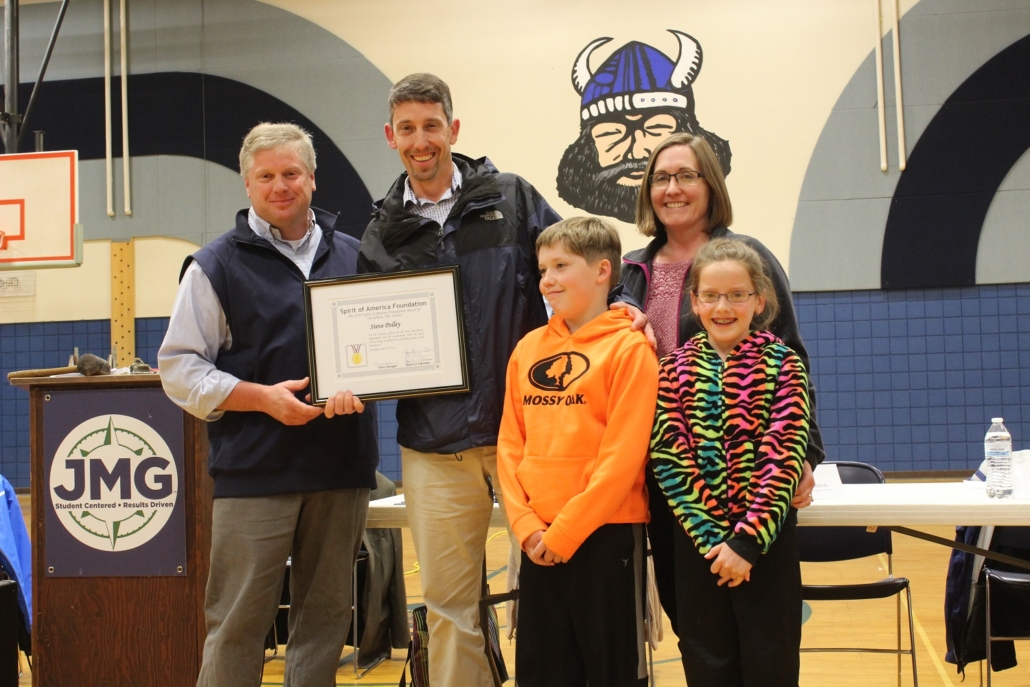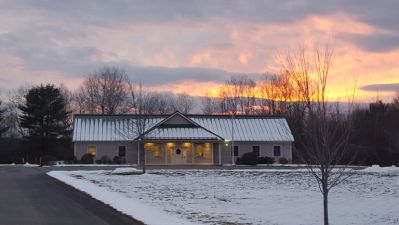Vassalboro tax rate raised at town meeting

Selectman Rob Browne, left, presents the 2018 Spirit of America Award to Steve Polley for his volunteer efforts for the Town Recreation Department and his involvement with the local Scouts Troop, in addition to community projects and fundraisers. The award was presented at the annual town meeting on Monday, June 4, at the Vassalboro Community School. Steve’s wife Hillary and family were present as Steve accepted the award. (Contributed photo)
by Mary Grow
At Vassalboro’s annual town meeting June 4, voters raised their tax rate by 90 cents for each $1,000 of valuation – plus a fraction of a cent more – by siding consistently with the board of selectmen and school board over the more fiscally conservative budget committee and by giving the Family Violence Project more than either the selectmen or the budgeteers recommended.
As the meeting started, Town Manager Mary Sabins said if voters accepted all budget committee recommendations, the tax increase for 2018-19 would be about 31 cents per $1,000. If they accepted all competing recommendations, they would see a 90-cent per $1,000 increase.
On the articles with differing recommendations from two boards:
- Voters approved $445,805 for town administration, rejecting the budget committee’s recommendation to save $500 by postponing new town office software (Art. 5).
- They took $37,500 for the capital reserve fund from taxation instead of from the town’s surplus as the budget committee recommended, agreeing with selectmen it was prudent to maintain a healthy savings balance (Art. 7).
- They approved a public works budget totaling $485,053, allowing $3,000 more for future fuel costs than the budget committee proposed (Art. 8).
- They rejected the budget committee’s proposal to cut $50,000 from the school budget, specifically from administration at Vassalboro Community School, although the differing recommendations did generate the school budget discussion that Budget Committee members hoped for (Art. 48). When Moderator Richard Thompson reached Art. 34, a list of 11 social service and similar agencies asking for town funds, Holly Weidner urged funding the Family Violence Project at the $4,925 requested, instead of the $2,250 recommended by the selectmen and the budget committee.
Weidner presented statistics showing that domestic violence is a growing problem in Vassalboro. Budget committee member William Browne said the recommendations on that and some of the other agencies were based on flat funding. On a vote of 52 to 34, the higher figure was approved.
Budget committee member Peggy Shaffer and retiring member Elizabeth Reuthe asked for thoughts about long-term approaches to changing school funding, before rising education costs make Vassalboro unlivable.
Shaffer pointed out that school costs are increasing faster than state aid for education, creating an ever-larger local tax burden. Most expenditures are required by law or otherwise fixed, leaving the budget committee few options. She and others also faulted administrators in the now-dissolved AOS (Alternative Organizational Structure) #92 for a confusing budget format and delays in getting figures to the budget committee.
Reuthe said that by allowing students their choice of high schools, Vassalboro offers a benefit, but an expensive one. Special education is another cost driver, she and school board member Jolene Gamage said: especially, as more babies are born to drug-addicted mothers, more youngsters will need special attention to succeed in school.
Except for the questions involving differing expenditure recommendations, voters approved the rest of the town meeting warrant with little or no discussion. For example, the proposed generator at Vassalboro Community School and the revised Building Permit Ordinance were approved without discussion.
Rick Denico Jr., Douglas Phillips and Richard Phippen were re-elected to the budget committee, Denico and Phillips for two years and Phippen for one year, to finish Eddie Scholz’s term after Scholz resigned. New budget committee members are Peter Allen, Barbara Redmond and Richard Suga. Voters also:
- Recognized Steve Polley, winner of this year’s Spirit of America award for volunteerism;
- Recognized Town Clerk Cathy Coyne for 20 years of service to Vassalboro;
- Recognized retiring Vassalboro Community School Principal Dianna Gram for 24 years of service at the school; and
- Heard short presentations from state Senate candidate John Glowa, House District 80 candidate Stephen Ball and District 80 incumbent Richard Bradstreet.
The annual town meeting continues at 8 a.m. Tuesday, June 12, in the town office meeting room, with polls open until 8 p.m. for voters to re-approve or reject the school budget approved June 4 and elect two local officials. John Melrose and Gamage are unopposed for re-election to the board of selectmen and the school board, respectively.










